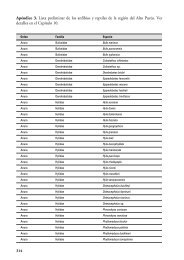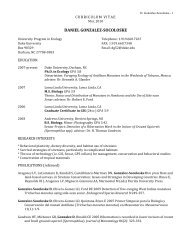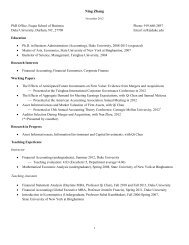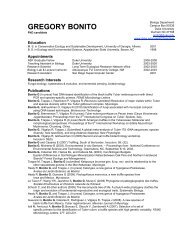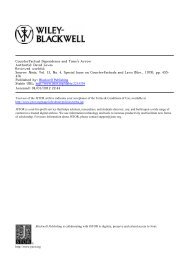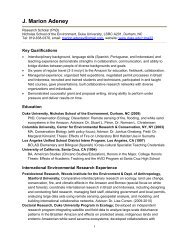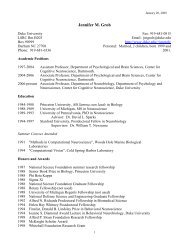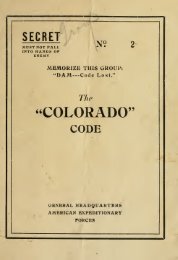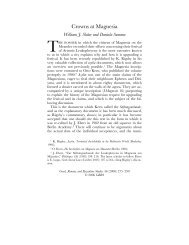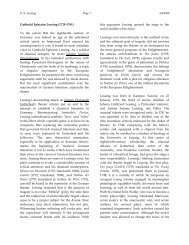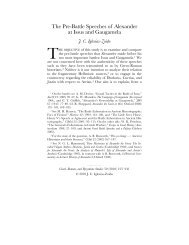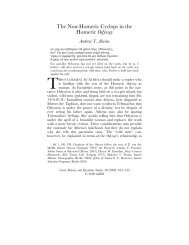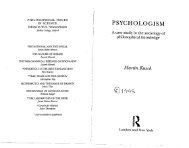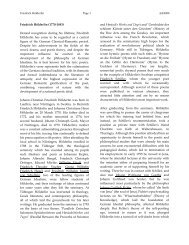Johann Wolfgang von Goethe (1749-1832) - Duke University
Johann Wolfgang von Goethe (1749-1832) - Duke University
Johann Wolfgang von Goethe (1749-1832) - Duke University
You also want an ePaper? Increase the reach of your titles
YUMPU automatically turns print PDFs into web optimized ePapers that Google loves.
J. W. v. <strong>Goethe</strong> Page 14 4/4/2008<br />
the new historical conditions: the problem is exactly<br />
the reverse of that in Die Leiden des jungen Werthers.<br />
Its complex ironies of tone and structure made the<br />
novel inaccessible to early audiences. Only in the<br />
twentieth century, as the accuracy of <strong>Goethe</strong>'s<br />
reading of the nineteenth century became clear, was<br />
it taken seriously; and only since World War II have<br />
its literary merits begun to be appreciated.<br />
The second part of Faust, completed in 1831 and<br />
published posthumously at <strong>Goethe</strong>'s desire, has<br />
had a similar--though, perhaps because of its<br />
undeniable stylistic virtuosity, not quite so extreme-<br />
-pattern of reception. Begun in the later stages of<br />
composition of Part I but completed only between<br />
1825 and 1831, it is an elaborate unfolding and<br />
historicizing of the first part. It shows Faust first at<br />
the imperial court, then at the "Klassische<br />
Walpurgisnacht" (classical witches' sabbath), where<br />
he ransacks Greek mythology to find Helena, who<br />
bears him a son. Later he returns to the wars of the<br />
emperor, then spends his old age supervising landreclamation<br />
projects. Satisfied that he is working for<br />
the benefit of humanity, despite the murder of an<br />
elderly couple (killed in a fire started by<br />
Mephistopheles' henchmen), at the end of his life<br />
Faust renounces magic and dies, still striving to<br />
improve his lands. Divine Grace, however, saves<br />
his soul, which is shown ascending in pursuit of an<br />
ever-receding ideal embodied once more in<br />
Margarete, "das Ewig-Weibliche" (the eternal<br />
feminine). Most of the play, from the middle of Act<br />
I to the beginning of Act IV, grounds both itself and<br />
all of modern European literature in the classical<br />
tradition, going back to what was understood at the<br />
time as the oldest levels of classical mythology. This<br />
undertaking is possible only on the basis of<br />
<strong>Goethe</strong>'s extensive learning, his ability to absorb<br />
and recreate literary styles, and his understanding<br />
of the nature of allegory, a mode of writing that had<br />
been virtually lost in the eighteenth century. But<br />
not only does the play sum up <strong>Goethe</strong>'s and<br />
Europe's relation to the classical tradition; it also<br />
reflects, like Wilhelm Meisters Wanderjahre oder Die<br />
Entsagenden , on the state of European culture and<br />
politics in <strong>Goethe</strong>'s last years, and on the human<br />
condition in general. Despite the richness of the<br />
text, it never loses sight of the central issues of<br />
Part I. Over and over it makes the points that<br />
pure truth cannot be permanently manifested in<br />
time--the tragedy of the historicist; that truth can<br />
be known only temporally and imperfectly in<br />
the world--the tragedy of the Platonist; and that<br />
truth can only be known through the mental<br />
projections of the seeker himself--the tragedy of<br />
the Kantian. Nowhere are the central concerns of<br />
European Romanticism more cogently summed<br />
up in all their ramifications than in <strong>Goethe</strong>'s last<br />
masterpiece. On 22 March <strong>1832</strong>, less than two<br />
months after making his final revisions of Faust,<br />
<strong>Goethe</strong> died, probably of a heart attack.<br />
Like all Romantics, <strong>Goethe</strong> was a profoundly<br />
dialectical thinker. For a variety of reasons,<br />
including the power of his personality, his<br />
preference for concrete detail over broad<br />
abstraction, the complexity of his views, and the<br />
uncongeniality of some of his attitudes in the<br />
prevailing political and social climate, his<br />
dialectic was disassembled and his works<br />
fragmented into the separate statements of a<br />
sage. Thus, opposing readings of <strong>Goethe</strong> have<br />
developed--as serene Olympian or tortured<br />
nihilist, as the embodiment of nineteenthcentury<br />
culture or as utterly out of touch with<br />
the world around him, as concerned or<br />
indifferent--and there has been a long tradition<br />
of ambivalence toward him in Germany. The<br />
nineteenth century had strong reservations<br />
about the unconventionality of his moral stance<br />
and about his rejection of a strong nationalist<br />
position, while later generations have had more<br />
difficulty with his lack of direct political<br />
engagement. But both the vehemence of these<br />
reactions and the continuing vitality of his work<br />
testify to a power of thought that he was aware<br />
of from the earliest years of his career. An<br />
acquaintance speaks of his drive in the early<br />
1770s "die Gedanken selbst, wie sie wären, zu<br />
denken und zu sagen" (to think and say the<br />
thought itself as it really is). This effort to<br />
articulate "the thought itself as it really is" is the<br />
challenge his writing still presents.



